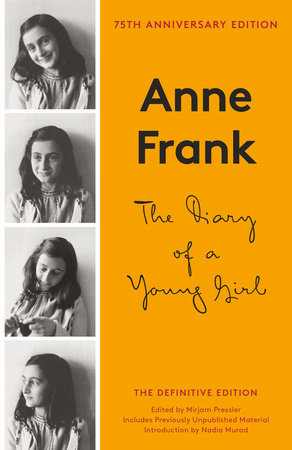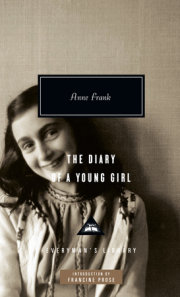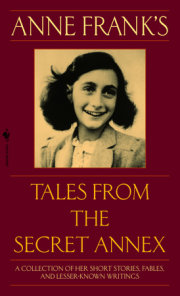June 12, 1942
I hope I will be able to confide everything to you, as I have never been able to confide in anyone, and I hope you will be a great source of comfort and support.
Comment added by Anne on September 28, 1942:
So far you truly have been a great source of comfort to me, and so has Kitty, whom I now write to regularly. This way of keeping a diary is much nicer, and now I can hardly wait for those moments when I'm able to write in
you.
Oh, I'm so glad I brought you along!
Sunday, June 14, 1942
I'll begin from the moment I got you, the moment I saw you lying on the table among my other birthday presents. (I went along when you were bought, but that doesn't count.)
On Friday, June 12, I was awake at six o'clock, which isn't surprising, since it was my birthday. But I'm not allowed to get up at that hour, so I had to control my curiosity until quarter to seven. When I couldn't wait any longer, I went to the dining room, where Moortje (the cat) welcomed me by rubbing against my legs.
A little after seven I went to Daddy and Mama and then tothe living room to open my presents, and you were the first thing I saw, maybe one of my nicest presents. Then a bouquet of roses, some peonies and a potted plant. From Daddy and Mama I got a blue blouse, a game, a bottle of
grape juice, which to my mind tastes a bit like wine (after all, wine is made from grapes), a puzzle, a jar of cold cream, 2.50 guilders and a gift certificate for two books. I got another book as well, Camera Obscura (but Margot already has it, so I exchanged mine for something else), a platter of homemade cookies (which I made myself, of course, since I've become quite an expert at baking cookies), lots of candy and a strawberry tart from Mother. And a letter from Grammy, right on time, but of course that was just a coincidence.
Then Hanneli came to pick me up, and we went to school. During recess I passed out cookies to my teachers and my class, and then it was time to get back to
work. I didn't arrive home until five, since I went to gym with the rest of the class. (I'm not allowed to take part because my shoulders and hips tend to get dislocated.) As it was my birthday, I got to decide which game my classmates
would play, and I chose volleyball. Afterward they all danced around me in a
circle and sang "Happy Birthday." When I got home, Sanne Ledermann was already there. Ilse Wagner, Hanneli Goslar and Jacqueline van Maarsen came home with me after gym, since we're in the same class. Hanneli and Sanne used to be my two best friends. People who saw us together used to say, "There goes Anne, Hanne and Sanne." I only met Jacqueline van Maarsen when I started at the Jewish Lyceum, and now she's my best friend. Ilse is Hanneli's best friend, and Sanne goes to another school and has friends there.
They gave me a beautiful book, Dutch Sagas and Legends, but they gave me Volume II by mistake, so I exchanged two other books for Volume I. Aunt Helene brought me a puzzle, Aunt Stephanie a darling brooch and Aunt Leny a terrific book: Daisy Goes to the Mountains.
This morning I lay in the bathtub thinking how wonderful it would be if I had a dog like Rin Tin Tin. I'd call him Rin Tin Tin too, and I'd take him to school with me, where he could stay in the janitor's room or by the bicycle racks when the weather was good.
Monday, June 15, 1942
I had my birthday party on Sunday afternoon. The Rin Tin Tin movie was a big hit with my classmates. I got two brooches, a bookmark and two books.
I'll start by saying a few things about my school and my class, beginning with the students.
Betty Bloemendaal looks kind of poor, and I think she probably is. She lives on some obscure street in West Amsterdam, and none of us know where it is. She does very well at school, but that's because she works so hard, not because she's so smart. She's pretty quiet.
Jacqueline van Maarsen is supposedly my best friend, but I've never had a real friend. At first I thought Jacque would be one, but I was badly mistaken.
D.Q.
Initials have been assigned at random to those persons who prefer to remain anonymous.
is a very nervous girl who's always forgetting things, so the teachers keep assigning her extra homework as punishment. She's very kind, especially to G.Z.
E.S. talks so much it isn't funny. She's always touching your hair or fiddling with your buttons when she asks you something. They say she can't stand me, but I don't care, since I don't like her much either.
Henny Mets is a nice girl with a cheerful disposition, except that she talks in a loud voice and is really childish when we're playing outdoors. Unfortunately, Henny has a girlfriend named Beppy who's a bad influence on her because she's dirty and vulgar.
J.R.--I could write a whole book about her. J. is a detestable, sneaky, stuck-up, two-faced gossip who thinks she's so grown-up. She's really got Jacque under her spell, and that's a shame. J. is easily offended, bursts into tears at the slightest thing and, to top it all off, is a terrible show-off.
Miss J. always has to be right. She's very rich, and has a closet full of the most adorable dresses that are way too old for her. She thinks she's gorgeous, but she's not. J. and I can't stand each other.
Ilse Wagner is a nice girl with a cheerful disposition, but she's extremely finicky and can spend hours moaning and groaning about something. Ilse likes me a lot. She's very smart, but lazy.
Hanneli Goslar, or Lies as she's called at school, is a bit on the strange side. She's usually shy--outspoken at home, but reserved around other people. She blabs whatever you tell her to her mother. But she says what she
thinks, and lately I've come to appreciate her a great deal.
Nannie van Praag-Sigaar is small, funny and sensible. I think she's nice. She's pretty smart. There isn't much else you can say about Nannie.
Eefje de Jong is, in my opinion, terrific. Though she's only twelve, she's quite the lady. She acts as if I were a baby. She's also very helpful, and I
like her.
G.Z. is the prettiest girl in our class. She has a nice face, but is kind of
dumb. I think they're going to hold her back a year, but of course I haven't
told her that.
Comment added by Anne at a later date:
To my great surprise, G.Z. wasn't held back a year after all.
And sitting next to G.Z. is the last of us twelve girls, me.
There's a lot to be said about the boys, or maybe not so much after all.
Maurice Coster is one of my many admirers, but pretty much of a pest.
Sallie Springer has a filthy mind, and rumor has it that he's gone all the way. Still, I think he's terrific, because he's very funny.
Emiel Bonewit is G.Z.'s admirer, but she doesn't care. He's pretty boring.
Rob Cohen used to be in love with me too, but I can't stand him anymore. He's an obnoxious, two-faced, lying, sniveling little goof who has an awfully high opinion of himself.
Max van de Velde is a farm boy from Medemblik, but a decent sort, as Margot would say.
Herman Koopman also has a filthy mind, just like Jopie de Beer, who's a terrible flirt and absolutely girl-crazy.
Leo Blom is Jopie de Beer's best friend, but has been ruined by his dirty mind.
Albert de Mesquita came from the Montessori School and skipped a grade. He's
really smart.
Leo Slager came from the same school, but isn't as smart.
Ru Stoppelmon is a short, goofy boy from Almelo who transferred to this school in the middle of the year.
C.N. does whatever he's not supposed to.
Jacques Kocernoot sits behind us, next to C., and we (G. and I) laugh ourselves silly.
Harry Schaap is the most decent boy in our class. He's nice.
Werner Joseph is nice too, but all the changes taking place lately have made him too quiet, so he seems boring.
Sam Salomon is one of those tough guys from across the tracks. A real brat. (Admirer!)
Appie Riem is pretty Orthodox, but a brat too.
Saturday, June 20, 1942
Writing in a diary is a really strange experience for someone like me. Not only because I've never written anything before, but also because it seems to me that later on neither I nor anyone else will be interested in the musings of a thirteen-year-old schoolgirl. Oh well, it doesn't matter. I feel like writing, and I have an even greater need to get all kinds of things off my chest.
"Paper has more patience than people." I thought of this saying on one of those days when I was feeling a little depressed and was sitting at home with my chin in my hands, bored and listless, wondering whether to stay in or go out. I finally stayed where I was, brooding. Yes, paper does have more patience, and since I'm not planning to let anyone else read this stiff-backed notebook grandly referred to as a "diary," unless I should ever
find a real friend, it probably won't make a bit of difference.
Now I'm back to the point that prompted me to keep a diary in the first place: I don't have a friend.
Let me put it more clearly, since no one will believe that a thirteen-year-old girl is completely alone in the world. And I'm not. I have loving parents and a sixteen-year-old sister, and there are about thirty people I can call friends. I have a throng of admirers who can't keep their adoring eyes off me and whosometimes have to resort to using a broken pocket mirror to try and catch a glimpse of me in the classroom. I have a family, loving aunts and a good home. No, on the surface I seem to have everything, except my one true friend. All I think about when I'm with friends is having a good time. I can't bring myself to talk about anything but ordinary everyday things. We don't seem to be able to get any closer, and that's the problem. Maybe it's my fault that we don't confide in each other. In any case, that's just how things are, and unfortunately they're not liable to change. This is why I've started the diary.
To enhance the image of this long-awaited friend in my imagination, I don't want to jot down the facts in this diary the way most people would do, but I
want the diary to be my friend, and I'm going to call this friend Kitty.
Since no one would understand a word of my stories to Kitty if I were to plunge right in, I'd better provide a brief sketch of my life, much as I dislike doing so.
My father, the most adorable father I've ever seen, didn't marry my mother until he was thirty-six and she was twenty-five. My sister Margot was born in Frankfurt am Main in Germany in 1926. I was born on June 12, 1929. I lived in Frankfurt until I was four. Because we're Jewish, my father immigrated to Holland in 1933, when he became the Managing Director of the Dutch Opekta Company, which manufactures products used in making jam. My mother, Edith Hollander Frank, went with him to Holland in September, while Margot and I were sent to Aachen to stay with our grandmother. Margot went to Holland in December, and I followed in February, when I was plunked down on the table as a birthday present for Margot.
I started right away at the Montessori nursery school. I stayed there until I was six, at which time I started first grade. In sixth grade my teacher was Mrs. Kuperus, the principal. At the end of the year we were both in tears as we said aheartbreaking farewell, because I'd been accepted at the Jewish Lyceum, where Margot also went to school.
Our lives were not without anxiety, since our relatives in Germany were suffering under Hitler's anti-Jewish laws. After the pogroms in 1938 my two uncles (my mother's brothers) fled Germany, finding safe refuge in North America. My elderly grandmother came to live with us. She was seventy-three years old at the time.
After May 1940 the good times were few and far between: first there was the war, then the capitulation and then the arrival of the Germans, which is when the trouble started for the Jews. Our freedom was severely restricted by a series of anti-Jewish decrees: Jews were required to wear a yellow star; Jews were required to turn in their bicycles; Jews were forbidden to use streetcars; Jews were forbidden to ride in cars, even their own; Jews were required to do their shopping between 3 and 5 p.m.; Jews were required to frequent only Jewish-owned barbershops and beauty parlors; Jews were forbidden to be out on the streets between 8 p.m. and 6 a.m.; Jews were forbidden to go to theaters, movies or any other forms of entertainment; Jews were forbidden to use swimming pools, tennis courts, hockey fields or any other athletic fields; Jews were forbidden to go rowing; Jews were forbidden to take part in any athletic activity in public; Jews were forbidden to sit in their
gardens or those of their friends after 8 p.m.; Jews were forbidden to visit Christians in their homes; Jews were required to attend Jewish schools, etc. You couldn't do this and you couldn't do that, but life went on. Jacque always said to me, "I don't dare do anything anymore, 'cause I'm afraid it's not allowed."
In the summer of 1941 Grandma got sick and had to have an operation, so my birthday passed with little celebration. In the summer of 1940 we didn't do much for my birthday either, since the fighting had just ended in Holland. Grandma died in January1942. No one knows how often I think of her and still love her. This birthday celebration in 1942 was intended to make up for the others, and Grandma's candle was lit along with the rest.
The four of us are still doing well, and that brings me to the present date of June 20, 1942, and the solemn dedication of my diary. Saturday, June 20, 1942
Copyright © 1996 by Anne Frank Edited by Otto H. Frank and Mirjam Pressler. All rights reserved. No part of this excerpt may be reproduced or reprinted without permission in writing from the publisher.












